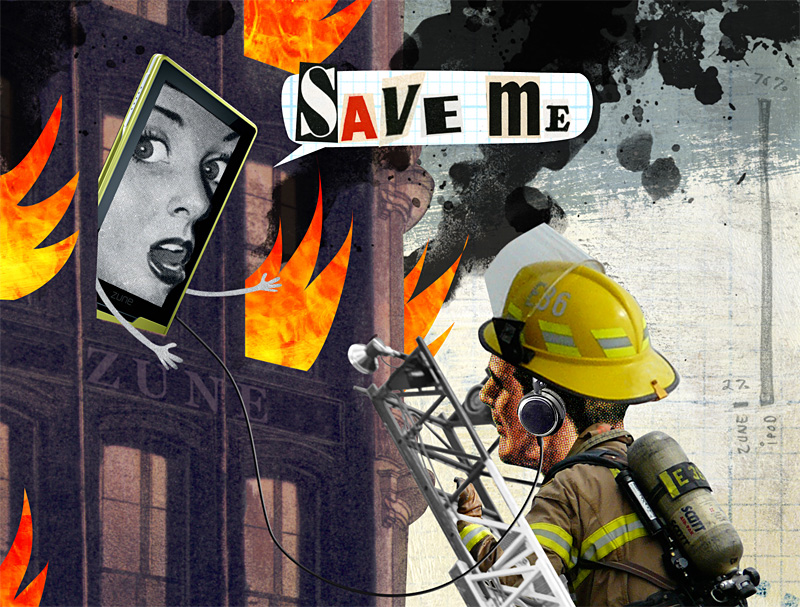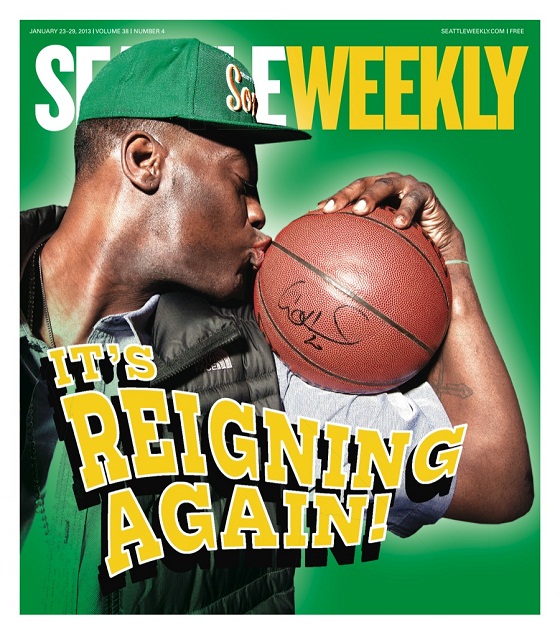On a sleepy street in Rockford, Ill., is a converted pharmacy from the 1930s called Toad Hall Books & Records, which management says is the home of well over 500,000 LPs, 78s, and 45s.
I keep a list of records on my iPhone to keep my eye out for when I’m faced with stacks and crates of vinyl. While visiting in-laws in Rockford over the holidays, my list included anything Miles Davis issued on Prestige, anything ever recorded by Nick Drake, and a copy of the Rolling Stones classic Exile on Main St.
Exile is not a rare record by any means, and I wasn’t surprised to find a copy among Toad Hill’s herd of Stones offerings. A few minutes later, a man rushed into the store desperate for—yes—Exile on Main St., to give to a friend who was only in town the rest of the day. Knowing I’d have plenty of chances to find Exile—and plenty of other ways to spend money at Toad Hall—I handed it over.
Months later, I was sitting at Café Presse reading an article that compared the songwriter Holly Miranda to Nina Simone. Normally, I would have added Miranda to my look-for list. Since I was in a wi-fi hot spot, I turned to my Zune, browsed the collection, and downloaded records from Miranda’s former band, the Jealous Girlfriends, and a refresher course on Nina Simone. The albums—and any subsequent tracks I picked up that month—were all covered through Zune Pass, an mp3 subscription service that offers unlimited downloads for $14.99 a month, and allows users to keep 10 mp3s forever, even after they stop subscribing.
Earlier this week, a similar possibility came to the iPhone, courtesy of the Seattle-based music-subscription service Rhapsody, taking some of the shimmer off the most interesting feature of Microsoft’s oft-maligned mp3 player.
Two months ago, I called the folks who represent Zune and asked if I could borrow one of the devices for a few weeks. Frankly, I was a little surprised that Zune, launched in 2006, was still around. According to The NPD Group’s Retail Tracking Service, Zune’s share of the mp3 player market in the U.S. was just 2 percent last year, compared to iPod’s 73 percent share. I’ve been an iPod—now iPhone—user for years; I wanted to try out Zune before it died, just as I’d like to see Havana before Castro perishes.
Unlike the Comandante’s regime, I quickly realized the Zune might actually be worth saving, if not without drawbacks. The device is small, sleek, easy to use, and its video looks great. It’s not the same app experience as, say, an iPod touch, and boasts none of the cultural cachet. But some of the extras that iPods lack have built Zune a cult-like following.
“I’d say I’m a fanatic to the point where I was thinking about making free commercials for ’em featuring Seattle bands,” says Andrew Chapman, singer/keyboardist in local band The Keeper. His favorite features include the high-definition radio, the ability to share tracks with people he doesn’t know, and being able to move music from his Zune to someone else’s computer. “I think if people became aware of what Zune is capable of, they’d be converts.”
What most impressed me during my experiment was the Zune Pass catalogue of six million mp3s that can be downloaded on the go. This experience is now being closely mimicked by Rhapsody, which starts at $10 a month. Though with Rhapsody you can’t simply download tracks and albums remotely to your iPhone with one click, as you can to a Zune with Zune Pass, you can add any songs or albums from the service’s nine million tracks to a playlist, and then download the playlist. (In other words, you can download Exile on Main St. after you first create a playlist called “Stones” or “Exile” or whatever. A spokesperson for Rhapsody said an update will provide the ability to download individual albums, and individual songs will be available within the next few months.) Plus, with the Rhapsody app, you don’t need wi-fi—you only need to be within your phone’s 3G network. The ability to download songs from virtually anywhere on a device of Zune’s quality—and now on the iPhone, via Rhapsody—is a huge step toward fulfilling the potential of digital music: the ability to acquire any music you want, anywhere, anytime, at a price that’s not free.
Thus far, subscription services account for only a fraction of music consumed in the U.S., largely because people “don’t appreciate or desire paying for music without owning anything at the end of the day,” says Susan Kevorkian, program director for mobile media and entertainment at IDC, a market-analysis firm that follows Microsoft.
But after using the Zune Pass for a couple of months, I’m further convinced that the idea of “owning” mp3s is a fallacy. No medium in the history of recorded music has ever been as disposable—we switch computers, iPods crash, and mp3s get lost. Instead of paying for digital albums a la carte that are bound to get lost, you may as well pay for a flat-rate subscription service that gives you access to millions of tracks that you can listen to again and again.
Microsoft’s next move for Zune involves bringing the interface and subscription service to its KIN phone next month and to its Windows 7 phone in the fall (on both of which tracks will be available with 3G service), which they hope will bring Zune to a new segment of customers. But Rhapsody’s new iPhone app—while not nearly as flashy or as easy to use—works with devices you already have (BlackBerry and Android apps are in the works), signaling that Zune Pass, the best thing Zune has going for it, has more competition and trouble in its near future. And Microsoft isn’t doing itself any favors by not making Zune compatible with Macs as iTunes is with Windows machines. Steven Levy, a senior writer at Wired and author of The Perfect Thing: How the iPod Shuffles Commerce, Culture, and Coolness, says that by sidestepping the Apple audience, Microsoft “sends a signal that the company is promoting the platform as a defensive measure to bolster its overall business, as opposed to attempting to establish a superior system that can win.'”
“A smaller but important point is that a lot of opinion-makers in both the music and technology business use Macs, and the inability to use Zune on Macs means that even features that surpass iTunes will go unnoticed by many,” adds Levy. “If you are trying to catch up—as Microsoft is doing with both phones and music—you can’t write off anything. When I see a great Zune implementation for Mac, then I’ll know Microsoft is getting serious.”








